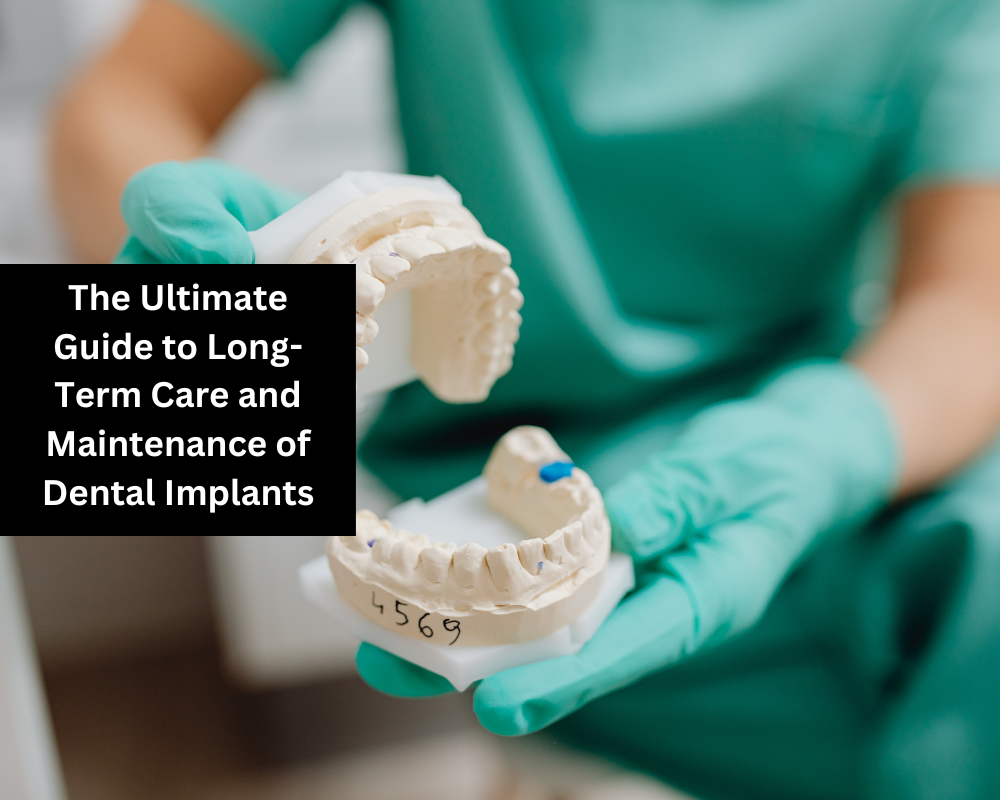A dental implant can be a great option to replace your lost teeth, attaching the crown to an augmented root in the jaw bone. You can have your healthy smile back without discomfort and get back your confidence. These implants can offer a strong base to replace the teeth like crowns or dentures, which makes them a permanent remedy for your lost teeth. These solutions can improve dental health as they resemble your real teeth feel and strength.
With regular upkeep and care, you can enjoy their effective functionality for a long time to come. Professional dental implant services can provide comprehensive care to make your dental restoration journey seamless. If you don’t do regular maintenance, neglect oral care, and don’t go for routine examinations, there could be implant failure and gum infections. Read this guide to learn about dental implant care and its long-term benefits.
Understanding Dental Implants
The advanced dental procedure for teeth restoration boasts the high-quality outcomes of dental implants. These are artificial tooth roots that are implemented in place of the losses that improve the appearance and functionality of the mouth. Dental implants in San Antonio mostly use materials like titanium, a strong metal. It is biocompatible and is fused into the jawbone, forming a strong base to make sure the prosthetic teeth feel and work just like your real teeth. Here are the major components of the dental implant structures essential for a successful procedure.
The Implant
The implant is also known as the post, which requires a surgical procedure to plant the titanium or zirconium implant material. It appears as a screw or cylinder attached to the natural root of the teeth. Once the post is installed into the jaw, it begins to fuse into the surrounding bone to create a strong base for attachment of the prosthetic tooth. This process is known as osseointegration, which requires up to three to six months for proper healing after the surgery.
The Abutment
When the implant is successfully fused into the root, and the site is healed, the abutment is attached, which will work to connect the prosthetic teeth with the implants. The professional dentist makes a small incision to expose the implant head for the connection. Even though there is no essential anatomical use of this component, it is a vital part of making the procedure successful.
The Crown
The crown attachment completes the prosthetic tooth placement with the abutment. It is customized to fit pre-natural real teeth size and shape. It meets all your oral function requirements, giving you a natural smile.
Here are the reasons to choose dental implants over other dental procedures:
- It is a more long-lasting treatment solution than your regular tooth restoration process.
- You can have the implants on without many issues when you maintain them regularly.
- There is no need to depend on the surrounding teeth to ensure the implants will be successful. There would be less chance of jawbone loss to maintain face shape.
- Dental implants will help you perform all dental functions without any pain or inconvenience caused by removable dentures.
The Lifespan of Dental Implants
The length of a dental implant relies on a number of variables, including good maintenance, patient health, the integrity of the bone and tissue, and smoking habits. If you are wondering how painful a dental implant is, the procedure won’t be painful with local anesthesia. However, infection or loose implants can be painful. The durability or lifespan of the implant depends on how often you go for routine dental examinations and proper oral hygiene.
Your general health, lifestyle habits, the kind of bone and tissue around the implant, and any potential effects on stability and healing also contribute to your dental implant condition. When you do proper maintenance, the implant can last more than 10 years with over 95% success rate. With more technology development in the surgery, implants can offer you a long-term fix for your tooth loss.
Daily Care and Maintenance
Brushing and Flossing: The Fundamentals
If you want to leverage the benefits of dental implants, start using a soft-bristle toothbrush and use it in circular movements around the implants to prevent any injury. Make sure to floss regularly to reduce gum disease risk and peri-implantitis by removing food particles and plaques. Use it in your regular oral hygiene regimens to maintain the implant’s health and durability.
Using the Right Oral Hygiene Products
Make sure to invest in proper oral hygiene products, which are recommended by your dentist. Use mouthwash and right toothpaste, which are designed specifically for dental implants, are antimicrobial, and have low abrasive qualities. Moreover, use products that contain fluoride to preserve the health of your implants, as they reduce the chance of plaque development. These products should not contain alcohol or hydrogen peroxide as they harm the gum and implant surface.
Professional Care and Regular Check-ups
The Importance of Regular Dental Visits
Make sure to go for routine check-ups if you use dental implants. During these check-ups, your dentist will look at the implants and their stability and prevent any disease or infections. They will assess the bone amount surrounding the implant and conduct X-rays to check for a thorough condition. Moreover, they will do routine clean-up to prevent tartar and plaque accumulation.
Professional Cleaning and Maintenance
Professional dental cleaning is an essential step if you have had a dental implant procedure. The deep cleaning technique, including scaling and root planing, will reduce the possibility of infection. The professional assessment will aid in monitoring implant health, identifying problems early, and delivering prompt care.
Read: Tips To Help Reduce Teeth Staining and Keep Your Smile Bright!
Addressing Complications
Peri-implantitis can be a major issue with dental implant cases, causing infection around the implant site. Implants can also fail due to a lack of bone tissue generation or mechanical issues. If severe pain is persistent with swelling around the implant site, there might be an infection. Moreover, if the gum bleeds or the implant moves, the abutment or crown might be lost. Get emergency care in these scenarios and learn about these symptoms. Maintain your oral hygiene, stop smoking, and see your dentist regularly to address any complications.
Lifestyle Considerations for Implant Longevity
Diet and Nutrition
If you have implant surgery, eat meals high in calcium, phosphorus, vitamin C, etc., and are present in fruits, vegetables, and lean meats with whole grains and dairy products, it can support your bone health for your implant stability. Don’t consume any hard food or sticky snacks or too many sweet things that put more stress on the implant.
Avoiding Harmful Habits
Smoking and alcohol drinking can impair the implants as the immune system becomes weak and doesn’t heal the site. This can cause implant failure and loss of the implants. Moreover, don’t risk your implant with nail-biting or opening packs. Using teeth as a tool can put too much pressure.
Secure Your Smile: Take Action on Your Dental Implant Care Today!
Maintaining dental implants properly is essential for improving your quality of life. You can sport a healthy smile when you avoid causing problems with your implants. Now you have an overall idea about how infection or possible implant failure can trigger. Avoid such scenarios with routine dental check-ups and regular oral hygiene routines. Make dental implant care a priority that ensures a happy smile and better oral health for many years.



